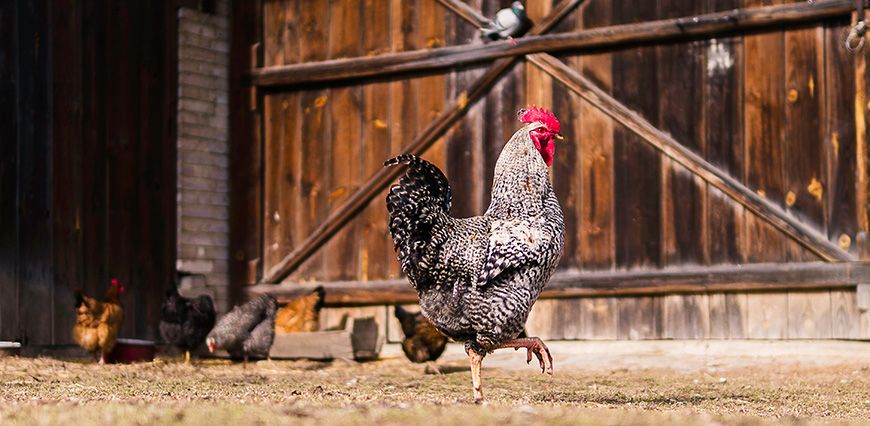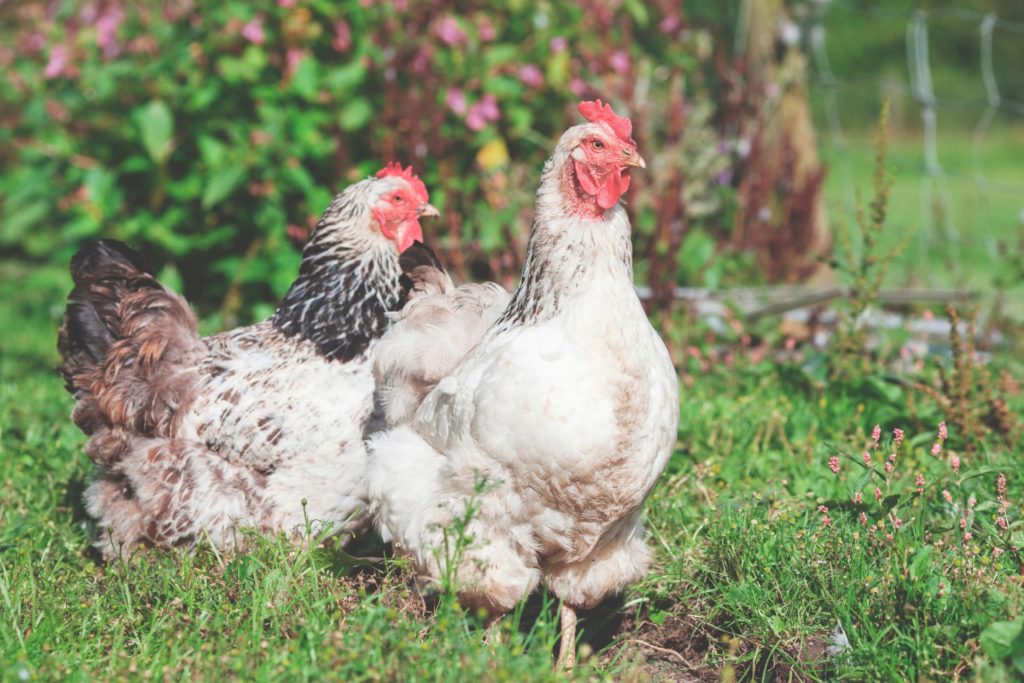Don’t kiss your chickens and other commonsense tips for poultry owners
by Dr. Ragan Adams | June 20, 2017 11:29 AM
 [1]
[1]During long summer evenings in the back yard, urban farmers and their neighbors enjoy watching their chickens amble about the backyard and listening to their clucking conversations. Some simple commonsense practices will keep these summer months filled with joyful memories and avoid an unpleasant hazard of poultry ownership – illness in either the birds or their people.
Keep your family flock healthy
-
 [2]
[2]Dr. Ragan Adams Watch your birds for signs of abnormal behavior or early symptoms of disease on a daily basis.
- Keep your chicken facility well maintained and clean.
- Don’t spread disease to your flock by carelessly transferring disease from another flock.
Good stewardship is an essential part of maintaining a home chicken flock. Every day, watch your birds for a few minutes to detect abnormal behavior or signs of disease (coughing, sneezing, diarrhea, abnormal feces).
Treating a disease in its early stages will increase the likelihood that the chicken will recover. Contact your local veterinarian or call the CSU Veterinary Diagnostic Laboratory Avian[3] Hotline for assistance, 970-297-4008. Tips on treatment found online may be unreliable unless taken from a trusted source, such as:
- Keeping Backyard Poultry[4] from the Centers for Disease Control and Prevention
- Small and Backyard Flocks[5] from CSU Extension
- Avian – Chickens, Turkeys, Ducks, and Game Birds[6] from CSU Veterinary Extension
Best practices
Keep your chicken coop clean, feed your birds a healthy and nutritious diet, and provide plenty of clean water and a shelter that protects them from the natural elements as well as predators.
Minimize your birds’ exposure to infectious diseases. Infectious diseases may spread from a bird newly added to your flock. Keep that bird quarantined for at least two weeks before adding it to your flock. House the new bird away from the flock, use different tools around that bird and handle that bird after you handle your healthy birds. If the new bird remains healthy for the two-week period, it is unlikely to introduce a disease into your flock.
Infectious organisms may also catch a ride on your clothes, shoes and hands so change clothes, clean shoes and wash hands if you have handled other birds before handling your own darlings. Be sure your visitors do the same.
Keep your family healthy, too
 [7]
[7]Every family can share stories of a simple cold or a memorable flu that spread from family member to family member. People can also catch diseases from animals, especially those who live in close contact with them. When pet birds are treated like family, cuddled, kissed and brought into the house, the risk of birds spreading unwanted disease to their humans increases.
Salmonella is a bacterial organism that birds carry on their feathers, secrete in their feces, and even pass into and on their eggs. They can transmit this organism without showing any signs of illness. Most people infected with salmonella develop diarrhea, fever, and abdominal cramps 12 to 72 hours after infection. The illness usually lasts four to seven days, and most people recover without treatment. However, in some people, the illness can be more severe. Severe illness is more likely to affect the elderly, infants, and those with weakened immune systems.
Earlier this month, the CDC reported on eight multistate investigations of people infected with salmonella in 47 states this year. The infections were traced back to live poultry in backyard flocks, primarily chicks and ducklings from several hatcheries. Of the 372 people affected, 36 percent (130) were children under 5, and 71 of the total were hospitalized due to the severity of their symptoms. Eleven of these people were in Colorado.
Kim Meyer-Lee, epidemiologist of the Larimer County Department of Health and the Environment said one case of salmonella associated with chickens is being investigated in Larimer County. She was involved in the recently reported CDC outbreaks and cases of salmonella in humans have been associated with backyard chicken flocks in Larimer County in previous years. She emphasizes that washing hands after handling poultry and poultry associated items is the best way to prevent disease spread.
Other diseases that people can catch from their poultry include avian influenza, West Nile virus, E. coli and Campylobacteriosis.
To minimize your family’s chances of catching an illness from your backyard flock, follow some simple practices:
- Don’t kiss your chickens or put your hands around your face after handling chickens.
- Wash your hands after handling your chickens, collecting eggs or working in the chicken house.
- Don’t wash chicken bowls and utensils in your kitchen sink.
- Keep your chickens in your yard or in their coop, not in your house. Never let chickens near areas where food is prepared or consumed.
Dr. Ragan Adams is a veterinarian and coordinator of Colorado State University’s Veterinary Extension[8] team. She is a senior research associate in the Department of Clinical Sciences[9].
- [Image]: http://source.colostate.edu/wp-content/uploads/2017/06/StockSnap_HMXLZQKNX2.jpg
- [Image]: http://source.colostate.edu/wp-content/uploads/2017/06/Adams.Ragan164.jpeg
- CSU Veterinary Diagnostic Laboratory Avian: http://csu-cvmbs.colostate.edu/vdl/avian-diagnostics/Pages/default.aspx
- Keeping Backyard Poultry: https://www.cdc.gov/features/salmonellapoultry/index.html
- Small and Backyard Flocks: http://articles.extension.org/poultry
- Avian – Chickens, Turkeys, Ducks, and Game Birds: http://veterinaryextension.colostate.edu/menu2/avian.shtml
- [Image]: http://source.colostate.edu/wp-content/uploads/2017/06/StockSnap_4NRIUP90HW.jpg
- Veterinary Extension: http://veterinaryextension.colostate.edu/menu3/personnel.shtml
- Department of Clinical Sciences: http://csu-cvmbs.colostate.edu/academics/clinsci/Pages/default.aspx
Source URL: https://source.colostate.edu/dont-kiss-chickens-commonsense-tips-poultry-owners/
Copyright ©2024 SOURCE unless otherwise noted.